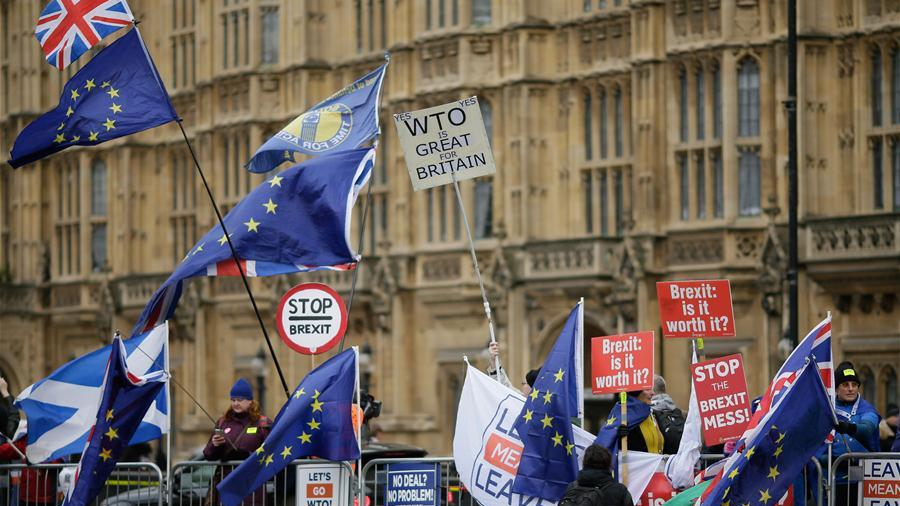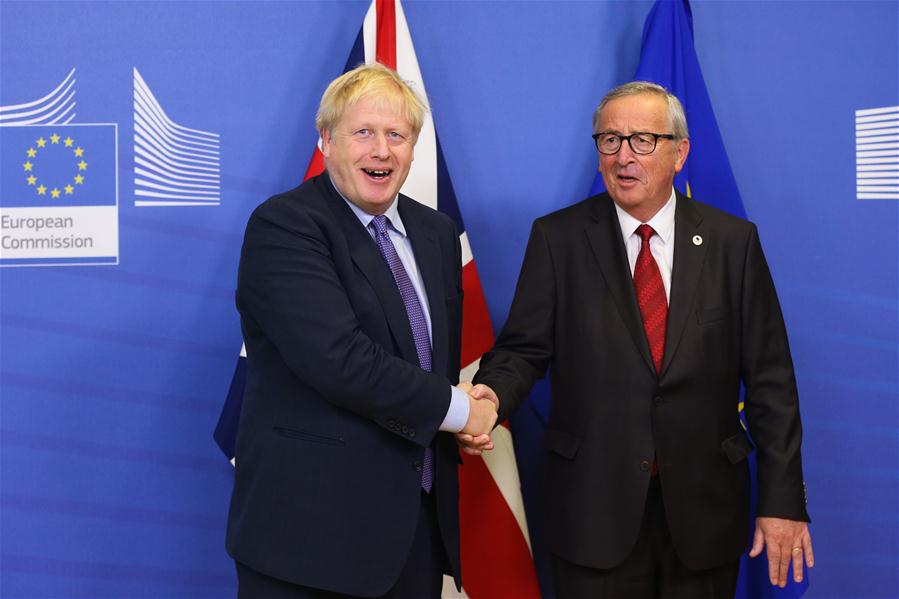
Pro-Brexit and anti-Brexit protesters hold flags and placards outside the Parliament in London, Britain, January 14, 2019. /Xinhua
Pro-Brexit and anti-Brexit protesters hold flags and placards outside the Parliament in London, Britain, January 14, 2019. /Xinhua
Editor's note: Richard Fairchild is an associate professor at the School of Management, University of Bath. The article reflects the author's opinions, and not necessarily those of CGTN.
Negotiations between the EU and the UK over the Brexit "divorce deal" are becoming ever messier by the day.
At the end of January, Britain officially secured its exit from the EU. At that time, the EU and Britain jointly negotiated and put into place the Withdrawal Agreement. It set out the terms of Britain's orderly withdrawal from the EU. Michel Barnier stated, "The Withdrawal agreement creates legal certainty where Brexit creates uncertainty." How wrong he was!
It would be good to think that such a "divorce bill" would be binding, creating the aforementioned legal certainty over Brexit. However, the British government has "muddied the waters" by passing the Internal Market Bill, which enables Britain to unilaterally breach the Withdrawal Agreement and effectively re-write chunks of it in Britain's favor.
It is a sorry situation when an agreement (which should effectively represent a contract between two sides) can be destroyed and re-written unilaterally by one party, through their own private legislation, giving them the right to do so. In this way, international law, contracts and agreements break down and become worthless, and the damage to trusting relationships can be irreparable.
The three areas of the Withdrawal Agreement that the Internal Market Bill enables Britain to challenge are fisheries, the Irish border and state aid.
At the start of October, the European Commission sent a letter to the British government, stating that the Internal Market Bill represented an illegal breach of the Withdrawal Agreement. The EU gave Britain a month (to the end of October) to respond, and to withdraw the Bill, otherwise the EU would take legal action against Britain.
In an incredible display of petulance and rudeness, Prime Minister Boris Johnson ignored the letter and the request.
The EU responded on November 3 by stating that the court action against the UK would move to the next stage. As noted by an article in the Independent, "ministers have already admitted that the bill will break international law, but say the policy is justified, because the law would only be broken in a 'limited and specific' way." In my opinion, this is a really bad justification by saying that "we are only breaking the law a little bit."
A key area of the Withdrawal Agreement the British government wants to rip up is the agreement over Northern Ireland. The issue of the Irish border between Northern Ireland and the Republic of Ireland was a key stumbling block in the Brexit negotiations throughout 2019. With the Republic of Ireland remaining in the EU and Northern Ireland leaving with the rest of Britain, the issue of the economic border between the two became a real problem: A hard British-Irish border was something to be avoided. It was a complex issue that threatened to scupper the whole Brexit deal.

British Prime Minister Boris Johnson (L) shakes hands with President of the European Commission Jean-Claude Juncker during a press conference at the European Commission headquarters in Brussels, Belgium, October 17, 2019. /Xinhua
British Prime Minister Boris Johnson (L) shakes hands with President of the European Commission Jean-Claude Juncker during a press conference at the European Commission headquarters in Brussels, Belgium, October 17, 2019. /Xinhua
As the January 31 Brexit deadline approached, the issue became ever sharper, with talks of hard and soft borders and backstops. In the end, the Brexit deal was saved by a compromise that both the EU and Britain could agree on and sign up to the so-called "border in the sea," bringing in border checks between Ireland and the UK.
The Internal Market Bill would overrule the Withdrawal Agreement that Johnson signed at the beginning of this year. The border checks on goods moving from Northern Ireland to the UK due to come in from December 31 under the Withdrawal Agreement, would be banned by the Internal Market Bill. It is a snub to the EU: Britain is leaving the EU, but will still have free trade with the EU through our own unilateral legislation.
This sets a dangerous precedent in international law. If one party to an internationally-signed and ratified agreement can simply introduce a domestic bill to rip it up, this brings up questions about the trust and solidity upon which such agreements are made.
The EU is now contemplating moving this to the next legal stage, which would involve Brussels issuing a "Reasoned Opinion" for Britain to comply with the law. If Johnson ignores this again, the European Commission could then take it to the European Court of Justice.
If the court rules against the UK, the latter would be legally obliged to stick to the terms of the original Withdrawal Agreement and the Internal Market Bill would become irrelevant. However, if Britain keeps on refusing to comply with the agreement, the court could impose financial penalties, either as a lump sum or as a daily fine until it complies.
So why is the British government taking such a stance? The UK government admitted breaking international law, but said that it was necessary to protect British economic interests. I believe that the government is taking it to the brink: The worst that can happen is that it will go to the European Court and Britain could then agree to comply with the agreement. Due to the long process and the legal hoops, this appears to be a no-lose situation for Britain.
The parties need to think beyond purely economic or financial situations and begin to account for psychology and emotions. Playing silly economic games can have long-term emotionally damaging effects which could destroy future relationships between the EU and Britain, souring any future cooperation or agreements between the sides. Also, Britain's reputation as a trusted trading partner and ally could be tarnished or destroyed, affecting negotiations between itself and other nations. Negotiations should take place in the spirit of compromise, trust as well as cooperation.
(If you want to contribute and have specific expertise, please contact us at opinions@cgtn.com.)